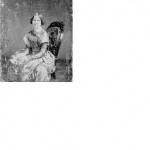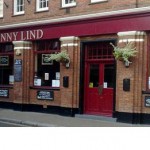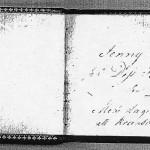A Victorian Autograph Book belonging to the world renowned Swedish singer Jenny Lind has been discovered in the attic of a Rye gentleman who plans to enter it for auction after his research is complete.
The book, with many entries in Swedish, contains famous signatures, including those of Wilhelmina and Augusta.
This valuable document should command a high sale price and there may well be interest from around the world.
Before becoming one of America’s first popular culture icons in 1850, Jenny Lind had already achieved fame in Europe. Audiences responded not just to her vocal ability but also to her virtuous reputation, believed at the time to be uncommon for a woman of the theatre. The Historical Society presents its Westervelt collection of Lind items as an appreciation of her magnetism.
Lind’s well-documented Cinderella story enhanced her appeal. She was born out of wedlock in 1820 in Stockholm, Sweden. Biographers describe her life of poverty as a child. Her mother, a cold and harddriving woman, sent the young girl away at an early age to live with relatives. After returning home in 1829, and finding herself alternately ignored and ill-used, Lind took comfort in singing. One day a woman passing by her home heard the young girl’s voice; the woman was so amazed that she sought out Lind. 
Jenny Lind
At the government’s expense, Lind was sent to the Royal Academy where she trained as a singer and an actress.
After appearing in an opera in 1844 at the Court Theatre in Berlin, Jenny became the most famous performer in Europe. Legends describe mobs of men in Germany and Austria unhitching the horses from her carriage to pull it themselves. In London, the royal court postponed their annual trip to Scotland in order to hear her. These stories, and others like them, preceded Lind’s arrival to New York in 1850. Though no one in the States had yet heard her voice, a Jenny Lind fever spread. Her pious and virtuous image appealed to Victorian sensibilities. Perhaps the most intriguing fact about Jenny Lind’s fame in America is that, although she sang operatic arias, which are usually associated with an elite taste, her appeal cut across class lines. Edward Wagenknecht, one of Jenny Lind’s many biographers, wrote that “the fact remains that this woman captivated the imagination of her century as no other artist had.”
At Castle Garden, a 6,000-seat theatre off Battery Park, nearly 7,000 people attended Lind’s first American concert on September 11, 1850. The enormous attendance was due to P.T. Barnum, the who organizer of one of the country’s first successful travelling circuses and established a museum of oddities. Barnum capitalized on Lind’s international fame to mount a concert tour of the United States. Before she arrived in New York, Barnum had already “worked the press” by launching a popular song writing contest. The winner, Bayard Taylor, won the honour of having Lind sing his song. Barnum also held The Great Jenny Lind Opening Concert Ticket Auction. The first ticket for an unprecedented $225 went to John Genin, a hat maker, whose business profited from his name being linked to Lind’s. Barnum’s savvy in promoting “The Nightingale” led Leoni das West – ervelt, the foremost collector of Lind materials, to call him “an advertising genius.”
The auction of her autograph book is awaited with eager ant i cipat ion and great speculation as to how much it will realise.
Left: The Old Town Pub that carries her name
